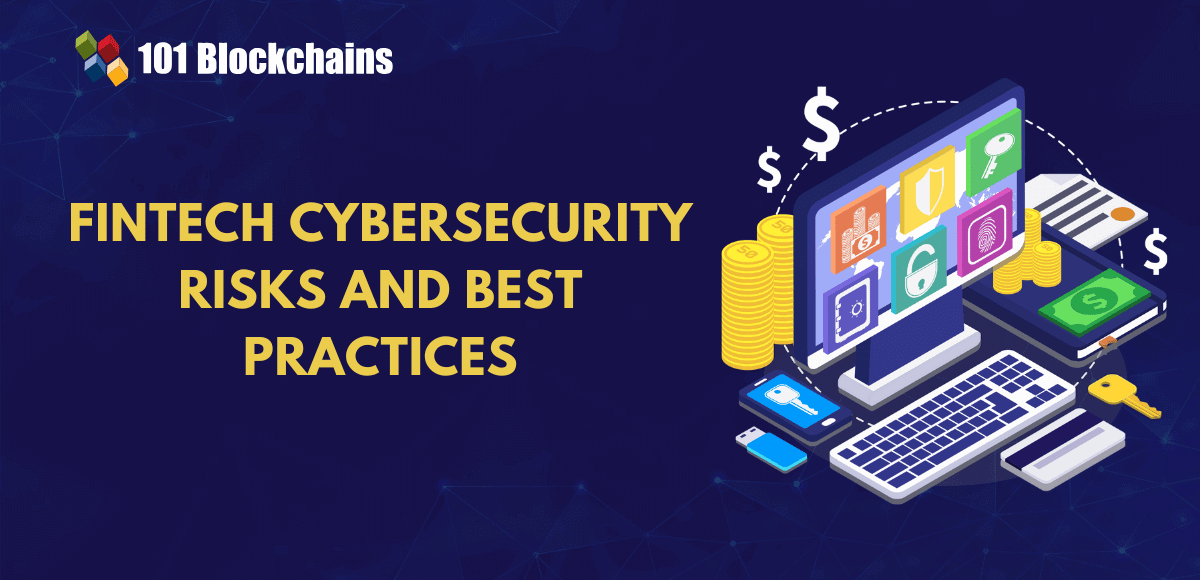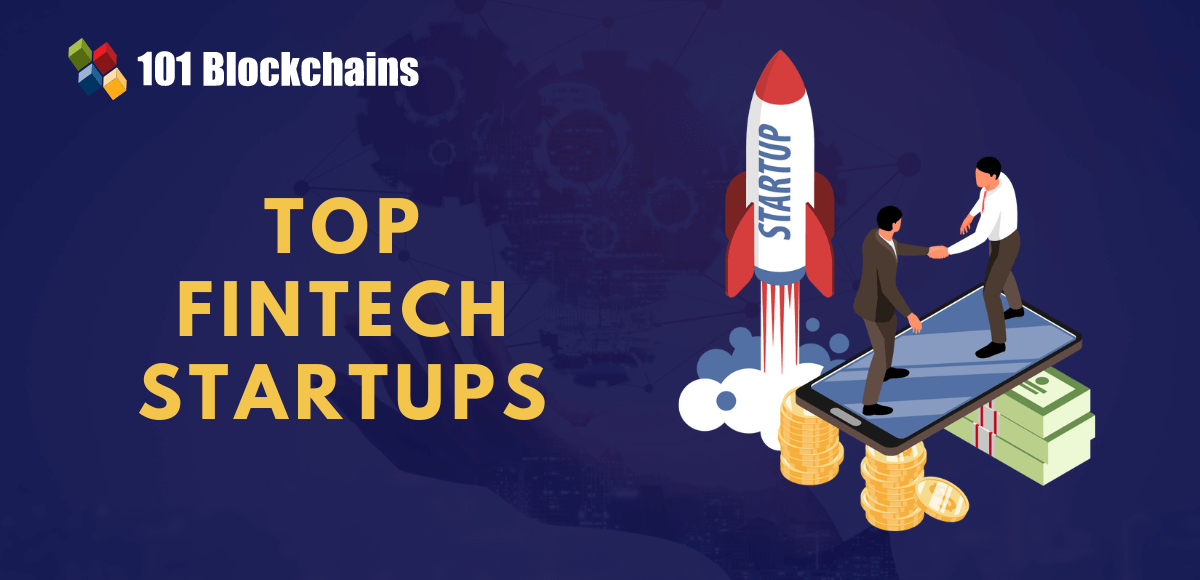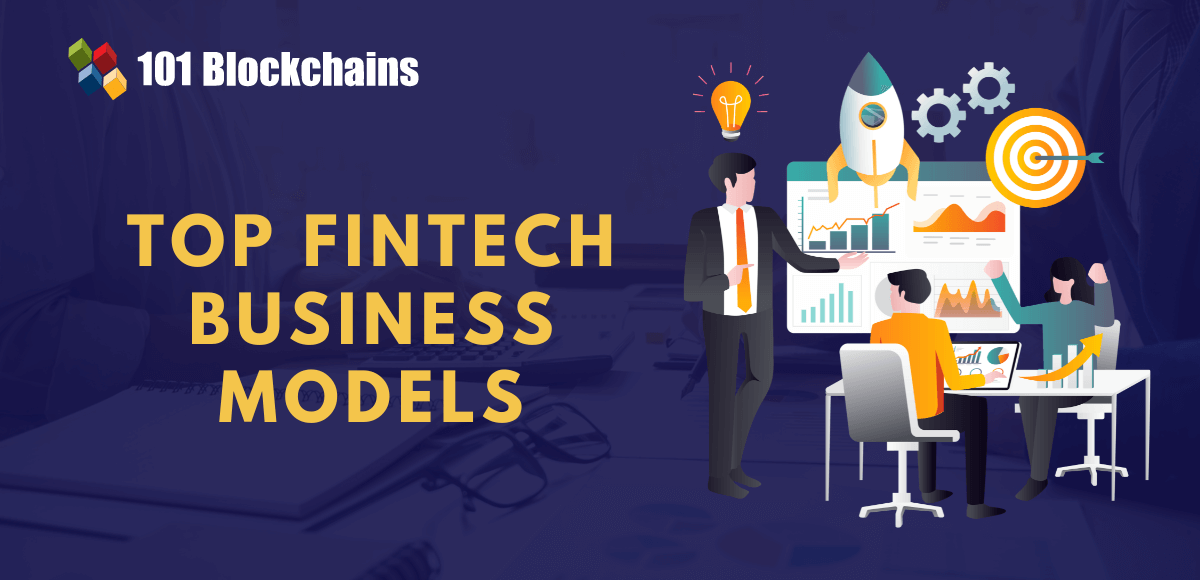Learn how blockchain truly works, master key definitions, and uncover what makes smart contracts so "smart." Dive into the fundamentals, gain valuable insights, and start your blockchain journey today!
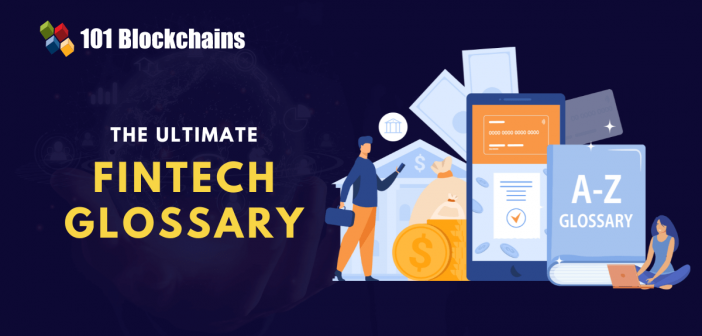
- FinTech
Georgia Weston
- on March 13, 2023
Ultimate FinTech Glossary For Beginners
Fintech has been responsible for inducing large-scale changes in the financial services industry. Experts have predicted that the market could reach a value of more than $180 billion by 2024. The search for a credible fintech glossary suggests that you must have identified how fintech could revolutionize financial services.
Internet accessibility and the development of financial service apps have been playing a crucial role in enhancing user experience with financial services. For example, you could access all the services of a bank with a few clicks on your smartphone. As of 2023, there are almost 30,000 fintech startups worldwide with innovative service offerings. Furthermore, interest in fintech funding has been growing substantially.
The value-based advantages of fintech have spurred interest in learning A to Z of fintech among many people worldwide. Fintech is an innovative concept that has everything to sustain the test of time and move toward the future of finance. However, beginners are likely to experience difficulties in understanding fintech without awareness regarding important terms in fintech. The following glossary of fintech terms and phrases could serve as a useful reference for beginners to understand fintech.
Important Terms in the World of Fintech
Have you felt like an outsider when your friends and colleagues are discussing fintech? You must have come across fintech phrases such as blockchain technology, decentralized finance and many other terms in discussions on fintech. Let us take a look at some of the most important additions in fintech terminology you must learn right now.
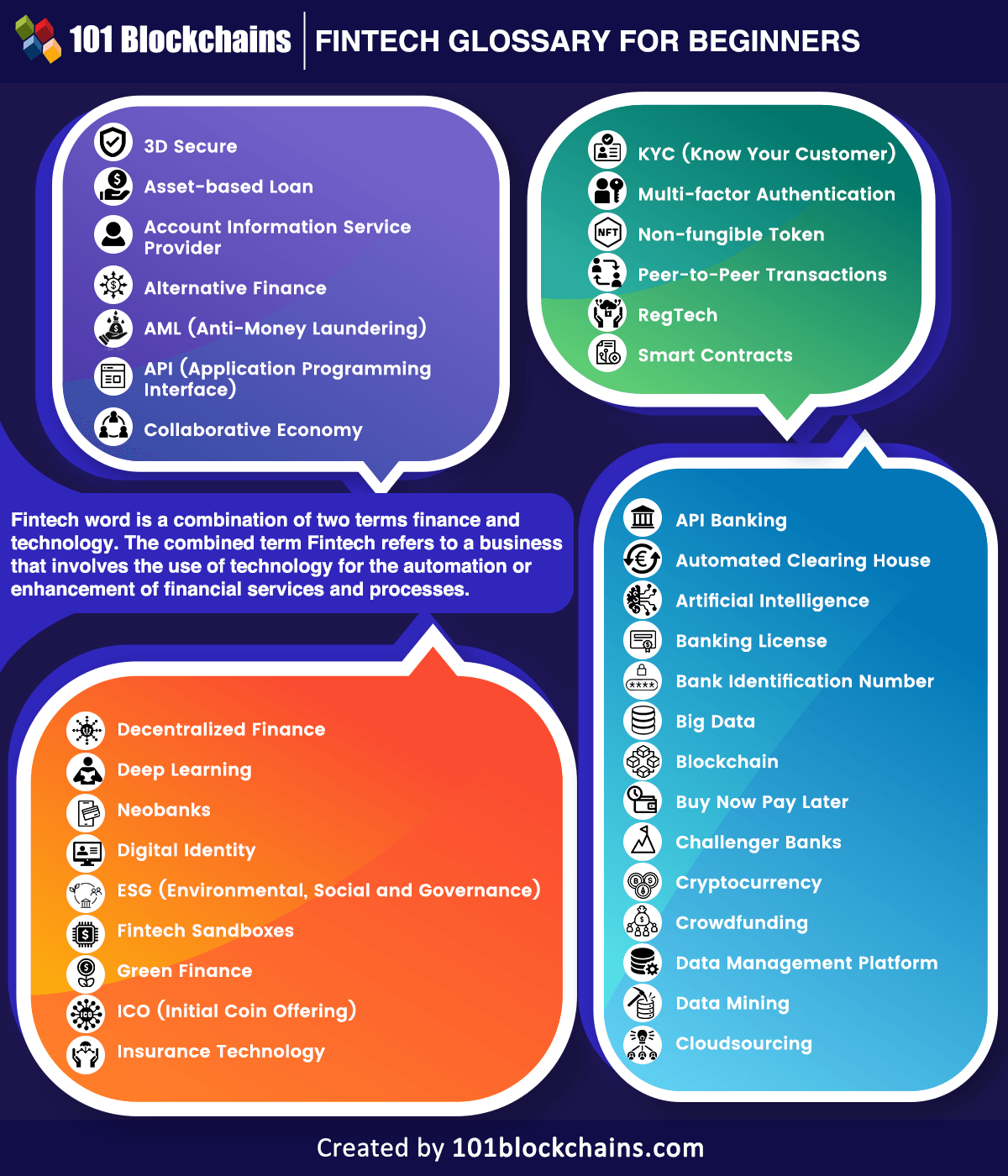
Please include attribution to 101blockchains.com with this graphic. <a href='https://101blockchains.com/blockchain-infographics/'> <img src='https://101blockchains.com/wp-content/uploads/2023/02/FinTech-Glossary-For-Beginners.png' alt='FinTech Glossary For Beginners='0' /> </a>
3D Secure
The phrase ‘3D Secure’ implies a concept for safeguarding the domain of fintech. It is a security protocol that leverages three distinct domains for addressing the concerns of security vulnerabilities and fraud in online card transactions. 3D secure is an important addition to a fintech terminology list for beginners. The term 3D refers to three domains, including the card issuer, stores that take payments and a 3DS infrastructure platform.
Learn the basic and advanced concepts of Fintech. Enroll Now in Fintech Fundamentals Course!
Asset-based Loan
The asset-based loan, or ABL, is a variant of business finance or a loan backed with the help of a corporate asset. Asset-based loans help in increasing short-term cash flow, and collateral could include property, accounts receivables, and equipment.
Account Information Service Provider
Another important answer to ‘What are Fintech abbreviations?’ would draw attention toward AISP or Account Information Service Provider. An AISP is a licensed company in an open banking model for helping third-party institutions in accessing financial information of customers with their approval.
Alternative Finance
You cannot find a fintech glossary list without the mention of alternative finance or Alt-fi. Alternative finance denotes the diverse range of financial solutions which are different from conventional financial instruments such as cash, stocks and bonds. Some examples of alternative finance point to crowdfunding and peer-to-peer lending.
Build your identity as a certified blockchain expert with 101 Blockchains’ Blockchain Certifications designed to provide enhanced career prospects.
AML
The collection of important words for fintech beginners also includes AML or anti-money laundering. AML denotes the collection of best practices followed by financial institutions for combating the concerns of money laundering. AML includes a set of clearly defined rules, regulations and processes which comply with legal criteria.
Application Programming Interface
The Application Programming Interface or API is an important technical tool for facilitating development of fintech applications. It features a collection of tools, procedures and protocols for developing applications that can help different fintech applications and systems interact with each other. APIs play a crucial role in facilitating customization of fintech solutions according to user requirements alongside streamlining daily activities.
API Banking
The list of notable fintech phrases also sheds light on API Banking, which serves a collection of regulated protocols, procedures and tools. API banking allows financial institutions or third-party organizations to access banking services through an API. Financial institutions can use API banking to offer secure and restricted access to their central systems for banking transactions to third-party systems.
Aspiring to make a lucrative career as a Fintech expert but not sure how? Check the detailed guide Now on How To Become A Fintech Expert
Automated Clearing House
The responses to “What are fintech abbreviations?” also invite attention toward Automated Clearing House or ACH. Automated Clearing House network is an electronic system for transferring funds, established in 1974. The payment system could support effective management of direct deposits, payroll, tax payments, consumer bills and many other payment services.
Artificial Intelligence
Artificial Intelligence refers to the innovative concept of encouraging robots to behave like human users through programming. AI could create new benchmarks in the world of fintech with prospects for training machines for problem-solving and learning tasks.
Excited to learn about the fundamentals of Bard AI, its evolution, common tools, and business use cases? Enroll now in Google Bard AI Course!
Banking License
Banking License is a legal document that indicates the permission of a bank to operate in a specific jurisdiction. The banking license demands various qualifications, such as market capitalization and detailing of business strategy.
Bank Identification Number
The A to Z of fintech also points to BIN or Bank Identification Number. It is available on credit, prepaid or debit cards of a bank and helps in identifying the card issuer. Retailers could use the BIN for validation of transactions using the card of a specific bank.
Want to know how the public and private sectors work to improve the financial system? Enroll Now in Central Bank Digital Currency (CBDC) Masterclass Course.
Big Data
Big Data is another crucial term in the domain of fintech, as it denotes the massive volume of organized and unstructured data related to financial services and applications. Financial institutions could use predictive data analytics for Big Data to obtain clear insights regarding the behavior of clients. The most common applications of Big Data include fraud detection and prevention, personalization of user experiences and sentiment analysis.
Blockchain
The most essential addition to a fintech glossary for 2023 would obviously emphasize blockchain technology. Blockchain is a distributed ledger of transaction records. Every block includes data about transactions, including the date, value, and time of transactions. Once a transaction block is verified and deployed on the blockchain, it is impossible to change the record. The most prominent applications of blockchain in fintech point at cryptocurrencies and DeFi.
Buy Now Pay Later
The collection of fintech acronyms for beginners also includes Buy Now Pay Later or BNPL. Buy Now Pay Later is a new variant of retail finance that helps customers in leveraging the benefits of simple repayment and no-cost EMIs.
Challenger Banks
The primary objectives of challenger banks distinguish them from traditional banks in the world of fintech. Challenger banks focus on encouraging innovation, client-centric operations, new operating models and customization of financial services. The common examples of challenger banks include non-banking financial institutions, mid-tier banks and specialized banks.
Cloudsourcing
Cloud providers offer cloud computing services to banks and financial institutions with many promising benefits. Cloudsourcing is an important addition to fintech terminology list as it enables fintech service providers to outsource IT services. A specific third-party vendor takes on the responsibility of managing all the IT services for a fintech company or platform.
Collaborative Economy
A collaborative economy or sharing economy is the formation of a group in which people join to share, swap and take loans of products and services. The group does not have to depend on a large organization to access desired fintech services and products.
Cryptocurrency
Cryptocurrency refers to a virtual currency based on a blockchain network with the power of decentralization. Cryptocurrencies are not subject to the control of centralized financial institutions such as banks. On the contrary, the pricing of cryptocurrencies depends on their utility and supply-demand dynamics.
Want to become a Cryptocurrency expert? Enroll Now in Cryptocurrency Fundamentals Course
Crowdfunding
Crowdfunding is a crucial addition to fintech glossary list as a unique concept in alternative finance. Individuals or organizations can participate in crowdfunding by seeking monetary donations from the public through internet. The contributions in crowdfunding serve valuable applications in sponsoring projects or ventures.
Data Management Platform
Data Management Platform or DMP is one of the important fintech acronyms which describes the technology used for collecting and managing data from different sources. Upon compilation, DMPs could distribute the data collection across broader channels. Data Management Platforms are crucial digital marketing tools with the advantage of accurate audience targeting.
Data Mining
Data mining is a vital concept in fintech as it focuses on investigating data to identify hidden patterns and correlations. The use of data mining in fintech could help in drawing precise forecasts regarding future trends. Data mining works through a powerful combination of artificial intelligence, Big Data and machine learning.
Decentralized Finance
The A to Z of fintech also includes another prominent highlight in the form of decentralized finance or DeFi. Decentralized finance leverages blockchain technology to enable easier access to financial products and services. DeFi provides the assurance of transparent transactions through smart contracts offered by DeFi apps.
Want to learn and understand the scope and purpose of DeFi? Enroll Now in Introduction to DeFi- Decentralized Finance Course
Deep Learning
The technologies used in fintech would also include deep learning, which utilizes machine learning for comprehensive analysis of unstructured data. Deep learning involves analysis of different layers of data to obtain high-quality and relevant insights. Deep data serves as actionable and useful information obtained through analysis of large datasets.
Neobanks
Neobanks is another prominent addition among words for fintech beginners. The term describes digital banks which offer their services through mobile applications. Customers do not have to visit a bank for general banking transactions like savings account reviews, money transfers and loans.
Digital Identity
Digital identity refers to the online version of physical identity of an individual, which depends on their online behavior. The online behavior of an individual could include information about the username, purchase behavior and search activity.
Excited to learn the concept of decentralized identity on existing digital ecosystems? Enroll in Decentralized Identity Fundamentals Course Now!
ESG
ESG is one of the tops mentions for questions like “What are fintech abbreviations?” with significant implications for fintech. The abbreviation denotes Environmental, Social and Governance standards that determine the social and environmental responsibilities of fintech companies.
Fintech Sandboxes
The basic terminology in fintech also points towards fintech sandboxes, which are testing programs for new business models. The fintech sandboxes help in testing new fintech products in actual business settings before deployment.
Green Finance
Green Finance represents the organized financial activities by fintech companies and platforms for ensuring better outcomes for the environment. It can cover investments and loans which support green initiatives or address climate change concerns.
Start learning Decentralized Finance (DeFi) with World’s first DeFi Skill Path with quality resources tailored by industry experts Now!
ICO
The collection of popular fintech phrases also includes ICO or Initial Coin Offering. It is a type of fundraising for crypto-based projects, similar to IPOs for conventional corporations.
Insurance Technology
Insurance technology, or InsurTech, is an emerging application in fintech focused on improving productivity for insurance firms. It works by lowering costs for insurance providers as well as consumers, alongside improving user experience. InsurTech helps in reducing concerns of fraud claims alongside ensuring efficient claims management and underwriting.
KYC
KYC or Know Your Customer is a mandatory addition among fintech acronyms and is essential for fintech functionalities. Know Your Customer procedures help fintech companies in confirming the identity of users.
Multi-factor Authentication
Multi-factor authentication or MFA is an effective security approach for helping users in verification of identity with multiple confirmation methods. One of the common examples of multi-factor authentication is the two-factor authentication method.
Non-fungible Token
Non-fungible tokens, or NFTs, are also prominent additions to fintech glossary for beginners. It is a blockchain-based asset that represents ownership of an asset on a blockchain network through smart contracts. Each NFT is unique and indivisible.
Peer-to-Peer Transactions
Peer-to-Peer or P2P transactions denote the transaction approach in which users interact directly with each other. For example, direct lending and borrowing between two people or direct person-to-person payments without involving intermediaries.
RegTech
Regulatory Technology, or RegTech, is an important part of fintech terminology list for beginners. It refers to the use of information technology in financial services for improvement of regulatory operations. RegTech focuses on ensuring better compliance, regulatory monitoring and reporting in financial services.
Smart Contracts
Smart contracts are a crucial component of the emerging fintech landscape for facilitating automated transaction processing and verification. Blockchain technology helps in implementing smart contracts and monitoring their applications.
Curious to understand the complete smart contract development lifecycle? Enroll in Smart Contracts Development Course Now!
Conclusion
The list of important words for fintech beginners offers an opportunity to obtain a brief understanding of the fintech market. You can come across important banking and financial services terms as well as technologies that drive fintech. As the domain of fintech gains popularity and more fintech startups emerge in the future, it will open up new avenues for career development.
Aspiring fintech professionals should rely on comprehensive training resources and certifications for pursuing careers in fintech. 101 Blockchains can help you learn more about technologies used in fintech and validate your skills with a fintech certification. Learn more about fintech and navigate your career path in the futuristic domain right now.
*Disclaimer: The article should not be taken as, and is not intended to provide any investment advice. Claims made in this article do not constitute investment advice and should not be taken as such. 101 Blockchains shall not be responsible for any loss sustained by any person who relies on this article. Do your own research!






